
The Division Bench of Chief Justice Abhay Shreeniwas Oka and Justice Hemant Chandangoudar held that the prohibitory order which was passed under the Section 144 of the Code of Criminal Procedure (CrPc) on 18th December 2019 was illegal and it doesn’t stand the test of judicial scrutiny laid down by the Apex Court. The case is concerned with the legality to prohibit public rallies by the Bengaluru Police Commissioner on December 18th, which was to be held on 19th December 2019 against the implementation of the Citizenship Amendment Act, 2019 (CAA 2019). The observation of the bench was with regard to the bunch of petitions filed before them and they aren’t concerned with the subject matter of the protests; the only concern of the bench is to make decisions which undoubtedly curtail the fundamental rights, indeed a preventive measure. As the preventive measure can curtail the fundamental rights of citizens and its formation of opinion is not reflected in the order. The petitions shall be taken up for hearing for the preliminary stage and issue whether permission granted can be revoked by passing an order under section 144 and that also without giving pre-post decision hearing have to be gone into.
The Bench questioned the State by stating that they cannot restrain the peaceful protests as far as the law is concerned. The State cannot base the restriction only on the assumption that every protest will be violent. The Advocate-General Prabhuling K Navadgi argued before the bench that the State is the Custodian of Fundamental Rights. It was the situation due to which the State took preventive measures to maintain law and order. The order taken by the Commissioner of Police was on the information from intelligence inputs from different quarters and he was satisfied that there is a possibility of participation of anti-social elements in the event due to which extreme measures were taken. The Senior Advocate Ravi Verma Kumar appearing for one the petitioner had argued that the order which was passed was arbitrary and ex-facie illegal as there is no formation of opinion. The only thing which can be done by the police is to regulate the rallies or the processions and cannot prohibit the protest; it is the Fundamental Rights of a Citizen, guaranteed under the Article 19 of the Constitution of India.
Key-Features:-
- The Citizenship Amendment Act 2019 (CAA) came into effect on 10th January 2020.
- The High Court said that, there is no second opinion that the State is responsible for maintain law and order.
- AG Navadgi argued that the imposition of Section 144 places temporary restriction on the fundamental rights of the petitioners in order to ensure safety and security to the public.
- Prohibitory orders imposed under Section 144 of CrPc on 18th December were illegal and cannot stand scrutiny of law as held by the High Court of Karnataka.
- The petition was filed by the Congress Leader Rajeev Gowda, MLA Sowmya Reddy and some city residents in parts.
Edited by J. Madonna Jephi
Approved & Published – Sakshi Raje
Reference:–
- Bar & Bench, ‘Section 144 Order Imposed In Bengaluru In December Illegal’ : Karnataka HC https://www.livelaw.in/news-updates/caa-protests-section-144-order-imposed-in-bengaluru-in-december-illegal-karnataka-hc-152691?infinitescroll=1
- Live Law.in, CAA Protests: Section 144 order imposed in Bangalore on December 18 was illegal: Karnataka HC https://www.barandbench.com/news/breaking-caa-protests-section-144-order-imposed-on-december-18-in-bangalore-was-illegal-karnataka-hc
- Insights IAS, SLAPPING SECTION 144 DURING CAA PROTESTS ‘ILLEGAL’: KARNATAKA HC https://www.insightsonindia.com/2020/02/14/slapping-section-144-during-caa-protests-illegal-karnataka-hc/








